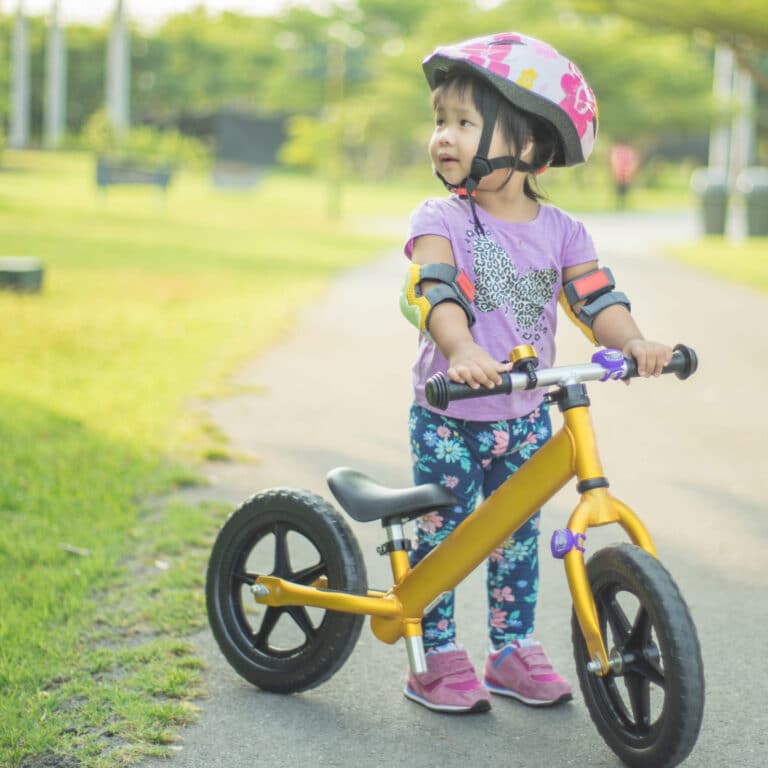The other day, my daughter was learning to ride her bike without training wheels. After a few wobbly tries and a couple of small falls, she stopped, crossed her arms, and said, “I can’t do it! I keep falling!”
As a dad, first I had to control my own emotions. I wanted to hold the bike steady for her, to make sure she didn’t fall again. But I knew that wouldn’t help her believe in herself. Instead, I said, “Falling is part of learning. Let’s take a deep breath and try again.”
I reminded her that every time she tried, she was getting better. After many more falls, eventually she finally found her balance and took off on her own. The smile on her face said it all — she had done it, and more importantly, she knew she could. I was so proud.
That moment reminded me that self-confidence isn’t built by avoiding failure — it’s built by overcoming it. When kids see their own progress, push past frustration, and succeed on their own, their confidence grows in a way that no amount of praise can match. This kind of confidence starts with a strong sense of self-worth, or self-esteem, which helps children believe they are capable and deserving of success. Understanding how self-esteem and self-confidence work together can help us better support our children as they learn and grow.
Why Self-Confidence Matters, and How Self-Esteem Helps Build It
Self-confidence means believing in your ability to do things—whether it is trying something new, solving a problem, or sticking with a challenge. When children are confident, they are more willing to take risks, try again after failing, and grow through experience.
A big part of building that confidence comes from self-esteem, which is a child’s sense of their own worth and value. When children feel loved, accepted, and capable, they are more likely to believe they can succeed – and thus, more likely to try. In this way, self-esteem serves as a foundation that supports the growth of self-confidence (Harter, 2012; Dweck, 2006). Together, these skills help build a child’s resilience so they can confidently navigate life’s ups and downs (Harter, 2012).

Strong self-confidence helps children:
- Take on challenges instead of giving up easily
- Make decisions and trust their judgment
- Learn from mistakes and bounce back from setbacks
- Speak up and share ideas
- Avoid self-doubt and negative thinking
And when children have healthy self-esteem, they feel worthy of success and are more likely to explore, learn, and grow through challenging situations. These two strengths work together.
Healthy Confidence Looks Like This:
Tries something new, even if it feels hard
Says, “I’ll keep trying” after a mistake
Shares thoughts and ideas clearly
Makes choices without always needing approval
Learns from feedback instead of giving up
Low Self-Confidence Might Look Like:
Avoids new things out of fear
Says, “I can’t do it” or “I’m not good at anything”
Is afraid to speak up or take small risks
Gets very upset by mistakes or feedback
Always asks for reassurance
How Parents Can Build Their Child’s Self-Esteem
1. Praise Effort, Not Just Success
Kids gain confidence through effort and persistence – when they see that trying matters more than being perfect.
Instead of: “You’re so smart!” Try:
“You worked really hard on that!”
Instead of: “You’re the best soccer player ever!” Try:
“You kept going, even when it was tough!”
2. Let Them Figure Things Out
It is tempting to jump in and fix things — but confidence grows when kids have opportunities to figure things out for themselves.
Instead of: Solving an argument for them…Ask:
“What do you think you could do to fix this?”
Instead of: Doing a tough homework problem for them…Encourage:
“I know this is tricky, but let’s figure it out together.”
3. Teach That Mistakes Are Part of Learning
Confident kids do not fear mistakes; they learn from them. When kids see that mistakes are part of growth, they are more likely to try new things.
Instead of: “It’s okay, I’ll fix it for you.” Say:
“Mistakes happen! What could you try next time?”
Instead of: “That was wrong.” Say:
“Let’s look at that again. What is another way you could do it?”
4. Give Real, Specific Praise
Praise works best when it is honest and focused on effort or improvement. This helps kids see the real progress that comes from making an effort.
Instead of: “You’re amazing!” Say:
“You practiced every day, and it really shows!”
Instead of: “You’re the best artist ever!” Say:
“You were so creative with those colors. Tell me about your drawing!”
5. Encourage Independence and Responsibility
When kids have age-appropriate responsibilities and are allowed to make choices, they feel capable and valued. They begin to believe, “I can handle this.”
Let young kids pick out their own clothes or help prepare for dinner.
Let older kids make decisions about school projects, activities, and friendships.
Allow kids to take small risks and learn from experiences.
6. Teach a Growth Mindset
Encourage kids to understand that they can improve with effort and practice (Dweck, 2006). This mindset helps build the confidence to keep trying, even when things are hard.
Use the word yet: “You can’t do it… yet. But with practice, you’ll get there!”
Share your own struggles and how you got through them.
Celebrate small wins and progress, not just big successes.
7. Show Unconditional Love
Confidence and self-esteem grow in loving, safe environment where kids know that they are loved and valued, no matter what. When kids feel loved and supported, they are more likely to believe in themselves and take healthy risks.
Spend quality time together—even small moments of your undivided attention make a difference.
Listen to their thoughts and feelings without judgment.
Remind them: “I love you no matter what.”
Dad Thoughts
Self-confidence is not something kids are born with — it’s something they build. And they build it through trying, failing, learning, and growing.
It isn’t about constant praise or avoiding challenges — it’s about helping kids see that their effort matters, their persistence leads to growth, and they are worthy and capable of succeeding.
By praising effort, encouraging independence, embracing mistakes, and creating a loving environment, we help our children believe in themselves and their abilities.
Just like my daughter learning to ride her bike, every child needs room to try, fall, and rise again — until they discover they can fly on their own.
Read More
References
- Dweck, C. S. (2006). Mindset: The New Psychology of Success. Random House.
- Harter, S. (2012). The Construction of the Self: Developmental and Sociocultural Foundations. Guilford Press.
- Orth, U., & Robins, R. W. (2014). The development of self-esteem. Current Directions in Psychological Science, 23(5), 381-387.



